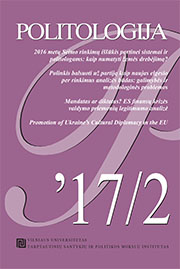Mandatas ar diktatas? Es finansų krizės valdymo priemonių legitimumo analizė
A Mandate or a Dictate? Legitimacy of the EU Financial Crisis Management
Author(s): Ugnė BartašiūtėSubject(s): Welfare systems, EU-Accession / EU-DEvelopment, Fiscal Politics / Budgeting
Published by: Vilniaus universiteto leidykla & VU Tarptautinių santykių ir politikos mokslų institutas
Summary/Abstract: The main aim of this article is to evaluate the legitimacy of the EU financial crisis management. The key question of this analysis is this: Was the management of the EU financial crisis illegitimate in respect of the citizens? If yes, to what extent was it illegitimate? This analysis concentrates on one particular measure – financial assistance given to the EU member states. The states that are being analyzed in this thesis are the following: Hungary, Latvia, Romania, Ireland, Spain, Portugal and Greece. In order to answer the question, the democratic legitimacy evaluation theoretical model of Fritz W. Scharpf was chosen. Based on this model, two dimensions of political process – input and output – are analyzed. Two hypotheses were raised in the work based on the theoretical model. H(1) Financial assistance to EU member states during the crisis measure was illegitimate because the citizens of the EU did not have influence in the decision making process. H(2) Financial assistance to EU member states during the crisis measure was illegitimate because it did not bring positive results. Based on the analysis, hypotheses are tested and the main findings presented. Based on the analysis of input legitimacy, hypothesis H(1) was confirmed. The financial assistance measure redistributed the balance of powers among national and supranational players in the EU. Institutions that are not elected directly and are not accountable to citizens gained more powers. Also, sovereignties of countries were constrained as these countries had to commit to implement various reforms. Based on the analysis of input legitimacy, hypothesis H(2) was partially denied. Analysis showed that the financial assistance measure helped to overcome financial crisis as well as to stabilize the situation in these countries and positive macroeconomic results were achieved in all countries. However, an analysis of various social welfare indicators showed that some of them deteriorated during the crisis period and that might have great impact on the quality of life of EU citizens.
Journal: Politologija
- Issue Year: 2017
- Issue No: 2 (86)
- Page Range: 84-123
- Page Count: 40
- Language: Lithuanian

